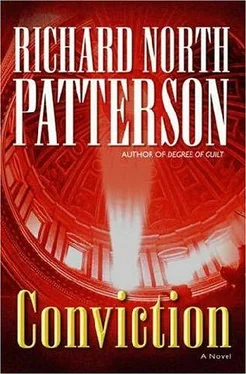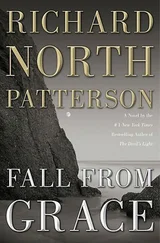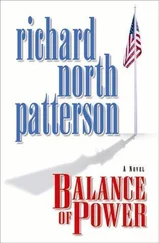Richard Patterson - Conviction
Здесь есть возможность читать онлайн «Richard Patterson - Conviction» весь текст электронной книги совершенно бесплатно (целиком полную версию без сокращений). В некоторых случаях можно слушать аудио, скачать через торрент в формате fb2 и присутствует краткое содержание. Жанр: Старинная литература, на английском языке. Описание произведения, (предисловие) а так же отзывы посетителей доступны на портале библиотеки ЛибКат.
- Название:Conviction
- Автор:
- Жанр:
- Год:неизвестен
- ISBN:нет данных
- Рейтинг книги:3 / 5. Голосов: 1
-
Избранное:Добавить в избранное
- Отзывы:
-
Ваша оценка:
- 60
- 1
- 2
- 3
- 4
- 5
Conviction: краткое содержание, описание и аннотация
Предлагаем к чтению аннотацию, описание, краткое содержание или предисловие (зависит от того, что написал сам автор книги «Conviction»). Если вы не нашли необходимую информацию о книге — напишите в комментариях, мы постараемся отыскать её.
Conviction — читать онлайн бесплатно полную книгу (весь текст) целиком
Ниже представлен текст книги, разбитый по страницам. Система сохранения места последней прочитанной страницы, позволяет с удобством читать онлайн бесплатно книгу «Conviction», без необходимости каждый раз заново искать на чём Вы остановились. Поставьте закладку, и сможете в любой момент перейти на страницу, на которой закончили чтение.
Интервал:
Закладка:
"A little. But I've never had to deal with it."
Mauriani nodded. "Back in 1983, our highly inventive California Supreme Court—Rose Bird and her cabal of death penalty abolitionists—ruled in the Carlos case that a felony murder charge required the prosecution to prove intent to kill. When Thuy Sen died, Carlos was still the law. Needless to say," Mauriani added dryly, "oral copulation with intent to kill would have been hard for me to prove. Odds are I wouldn't have asked for the death penalty, and maybe Rennell and you would be asking for parole, instead of trying to stave off an all-too-certain execution."
As Mauriani paused to sip more wine, savoring the vagaries of fate, Terri felt him becoming more digressive; there was a flush to his forehead, and the veins in his face had begun dissecting his cheeks. "Sadly for Rennell," he pronounced, "the law, you might say, devolved. The voters sent Chief Justice Bird and her soul mates back to private practice—they were, it turned out, a bit too visionary. And two weeks before Thuy Sen was murdered, the new conservative majority reversed the Carlos rule. It was the final piece of ill luck for Payton and Rennell—they were the first defendants in a felony murder trial after Carlos was abolished, and they'll be the last to die at the hands of the City and County of San Francisco.
"If Rennell Price wanted to tell the jury why they shouldn't have sentenced him to death, that was up to him. But he chose not to."
"And you chose to seek the death penalty," Terri rejoined. "Would you have done that if Thuy Sen were the daughter of a black crack addict?"
Instantly alert, Mauriani sat straighter, regarding her with level blue eyes. "If so," he answered succinctly, "then I acted with exquisite fairness. If not, we're about to execute two men who are among the truly deserving. Either way I'll sleep tonight." He paused, as though hearing himself, then continued in a softer tone. "What you're complaining about is that, as a prosecutor, I had almost complete discretion over life and death decisions. Which was no joy to me at all.
"It's no pleasure to explain to some other victim's family the reasons—however good—that you're not seeking the death penalty for the murder of their wife or son or sister when you did so for the murder of Thuy Sen. It's not pleasant to consider what a miserable job we do of protecting children, or the fact that we're virtually guaranteeing that some of them will grow up to murder other children. Let alone to think you might be wrong—after all, you can't turn loose a dead man just because he's innocent.
"But I didn't worry about that here," Mauriani finished, "and neither did the jury." Draining his glass, he smiled without humor. "Even though the brothers came up with that sterling alibi."
FIFTEEN
FIVE DAYS BEFORE TRIAL, MAURIANI RECEIVED A LETTER FROM Yancey James.
He read it with rising irritation. Then he placed a call to James. "What's this with the supplemental witness list?" he asked. "We're five days away from trial."
"The amenities," James rejoined in a parody of a preacher, "must give way to the in-ter-ests of justice. Tasha Bramwell's just now come forward—despite, Louis, the potential opprobrium she could face on account of your prejudicial and perverse public relations efforts to paint my clients as guilty before they're even tried. Are you now suggesting that you'll try to bar the courtroom doors to truth?"
Mauriani could imagine James lounging back in his chair, expansive with self-admiration and, perhaps, a cocaine-fueled grandiosity. "Cut the bullshit," the prosecutor said coldly. "Who the hell is Tasha Bramwell, and what 'truth' does she have to offer?"
Mauriani's annoyance elicited a soft chuckle from Yancey James. "Time will tell, Louis. Truth will out . . ."
The repeated use of his given name was beginning to irk Lou Mauriani. "Damned straight it will," he shot back. "Right now. Either you give proper notice of what this mystery woman has to say, or she'll never see the inside of Judge Rotelli's courtroom."
This proposition—so plausible that even James could not dispute it—provided Mauriani with a moment's welcome silence. When James spoke again, his tone was sober and more tentative. "This young woman is close to Payton Price. She's way too concerned for his welfare to live in silence with what she knows—that she was with him and Rennell for several hours on the very afternoon that Thuy Sen disappeared."
"You must be joking."
"No, indeed, Louis—no, indeed. You can try to exclude her. But if you do that, you'd be condemning two innocent young men, perhaps to death."
Mauriani put down the phone and then called Charles Monk.
* * *
At eight-thirty the next morning, Monk and Ainsworth arrived at Mauriani's office, its tile floor littered with the building blocks of an impending trial—witness statements, crime lab results, mug shots, Liz Shelton's report, and autopsy photographs of Thuy Sen. For an instant, Monk glanced at the photographs, shaking his head, and then said briskly, "Tasha Bramwell."
"Yeah." Mauriani poured himself a third cup of coffee. "Tell me all about her."
* * *
Like Eddie Fleet's girlfriend, Betty Sims, Tasha Bramwell lived in public housing in the Bayview. But the impression she made on Monk was different: more that of an office worker who aspired to be a professional—straight, processed hair; a neatly pressed skirt; clean white cotton blouse—and her apartment was as meticulous as her trimmed and painted nails. She was tall and slender, with a thin, fox-pretty face; Monk knew at once from her wary eyes that their presence made her nervous.
They sat at her kitchen table, with a vase of flowers between the two detectives and the woman. "I was with them both," Tasha insisted. "Right here. From maybe noon to almost eight o'clock."
"Was anyone else here?" Ainsworth asked.
"No. Just the three of us."
"Anyone visit—someone who might corroborate what you're telling us?"
Tasha screwed up her face in what, to Monk, seemed a pantomime of someone straining to remember. "Don't recall," she said finally. "Didn't seem important then."
"What did the three of you do?" Monk inquired. "All that time."
"Stuff. Listened to music, watched some TV—soap operas, mostly. Rennell likes those."
"That's all?"
Tasha's eyes froze and then refocused on the flowers instead of on Monk. In a wan, embarrassed voice, she answered, "Payton and me made love."
If Tasha was acting, Monk thought, she had a certain gift. Though perhaps it was lying, not sex, which discomfited her most. Evenly, he asked, "With Rennell in the room?"
"No." Her tone was sharper, defensive. "Alone, in my bedroom."
"How long were you alone?"
Tasha's eyes lowered. "I don't know. Maybe an hour or so."
"For that hour or so, where was Rennell?"
"Sitting here, I guess." She hesitated, then added, "Rennell sleeps a lot. I think maybe he was asleep on the couch when we came out."
"But you don't know Rennell was here."
Tasha gave a minimal shrug, as though she found the question inconsequential. "I guess not, no. But he doesn't go too many places without Payton."
Curious, Monk considered asking why. Then Ainsworth interjected, "You say they were here till eight or so. How do you remember that?"
" 'Cause I work weeknights over at the Double Rock Bar. Shift always starts at eight."
"That your only job?"
"Yeah." Tasha nodded toward a small shelf of what appeared to be textbooks. "Days I go to City College," she amplified with a touch of pride. "I'm studying to be an accountant."
Considering her, Monk felt the habitual melancholy he experienced on returning to the Bayview, this time at the depressing fact that, even while reaching for something better, Tasha Bramwell remained entangled with a man like Payton Price. "Thuy Sen disappeared on a Tuesday," he said. "Got classes on Tuesday?"
Читать дальшеИнтервал:
Закладка:
Похожие книги на «Conviction»
Представляем Вашему вниманию похожие книги на «Conviction» списком для выбора. Мы отобрали схожую по названию и смыслу литературу в надежде предоставить читателям больше вариантов отыскать новые, интересные, ещё непрочитанные произведения.
Обсуждение, отзывы о книге «Conviction» и просто собственные мнения читателей. Оставьте ваши комментарии, напишите, что Вы думаете о произведении, его смысле или главных героях. Укажите что конкретно понравилось, а что нет, и почему Вы так считаете.












